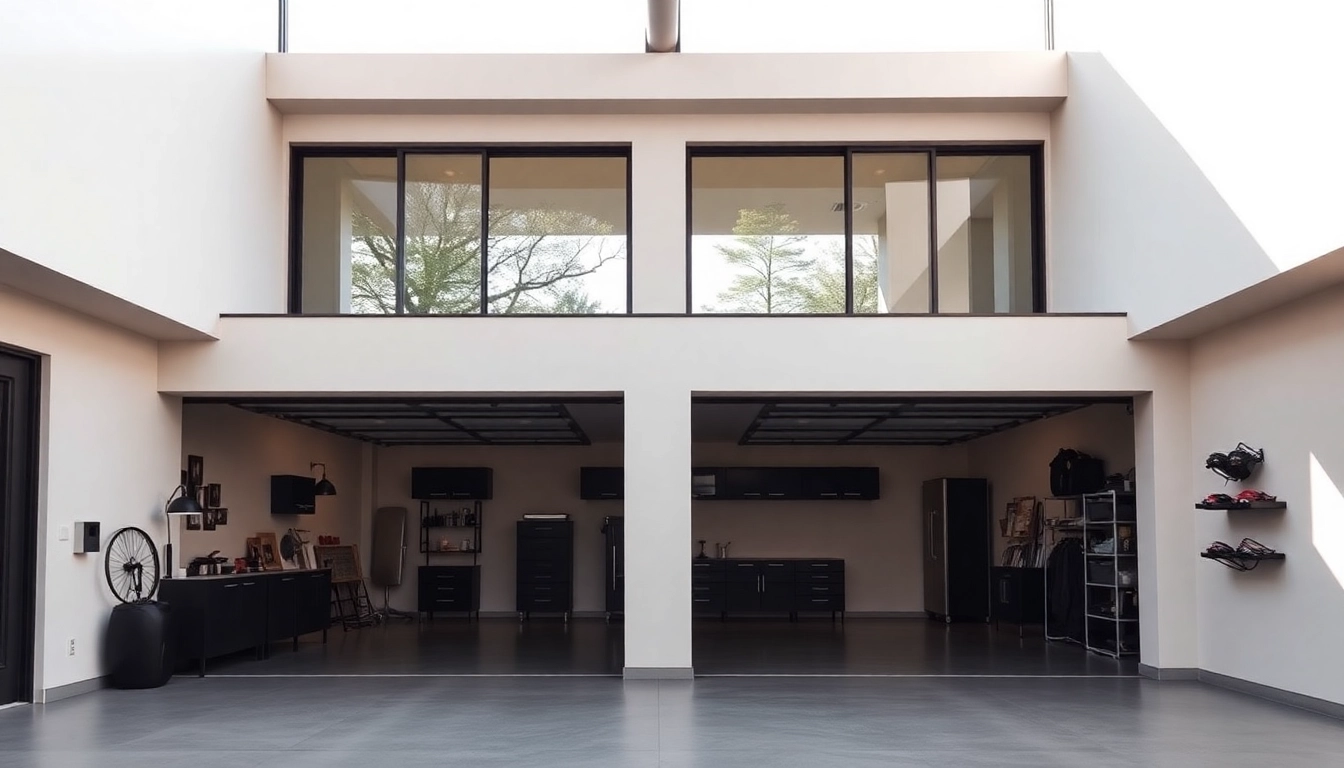Designing Your Custom Garages: Tailored Solutions for Every Dream Home

Understanding Custom Garages
What Are Custom Garages?
Custom garages are bespoke structures tailored to the specific needs, preferences, and spatial constraints of homeowners. Unlike standard garages that are often mass-produced or built from templates, custom garages provide a unique opportunity to create a space that aligns perfectly with the owner’s vision and requirements. These garages can be constructed using a variety of materials, including wood, metal, and prefabricated components, and can be designed to accommodate various uses beyond just vehicle storage, such as workshops, home gyms, or hobby spaces.
Benefits of Building Custom Garages
Investing in a custom garage offers numerous advantages:
- Tailored Functionality: Homeowners can design their garage to best suit their lifestyle and needs, whether that’s adding extra storage, an office space, or a place to work on projects.
- Aesthetic Appeal: Custom garages can complement the existing architecture of a home, enhancing its overall curb appeal and increasing property value.
- Enhanced Durability: With the use of high-quality materials and construction methods, custom garages can offer improved durability and functionality over standard options.
- Increased Usability: Designed to the right specifications, these garages can maximize usable space and improve organization.
- Energy Efficiency: Custom garages can be built with energy-efficient features, such as improved insulation and HVAC systems, which can lead to long-term savings on utility bills.
Types of Custom Garages Available
When exploring custom garages, homeowners can select from several types:
- Detached Garages: These standalone structures provide increased flexibility in design and can be placed anywhere on the property.
- Attached Garages: Built as part of the main house, these garages save on space and connect seamlessly with the home’s design.
- Carports: For those looking for a less enclosed option, carports offer protection for vehicles while remaining open to the surrounding environment.
- Workshop Garages: Designed for DIY enthusiasts and tradespeople, these garages often include features tailored for tool storage, woodworking, or automotive work.
- RV and Boat Garages: These oversized garages are specifically designed to store recreational vehicles and boats, with higher ceilings and wider doors.
Choosing the Right Design
Elements of a Functional Garage Design
Designing a custom garage goes beyond aesthetics. Here are some critical elements to consider:
- Space Allocation: Consider how much space is needed for vehicles, storage, and any additional functions, such as work areas. A well-planned layout can prevent clutter and promote ease of use.
- Access Points: Ensure the garage has adequate entries and exits for convenience, especially if it will serve multiple functions.
- Storage Solutions: Incorporate shelving, cabinets, and overhead storage for tools and seasonal items, enhancing organization and usability.
- Lighting: Good lighting is essential, both natural and artificial. Skylights or large windows can provide natural light, while well-placed LED lights will ensure visibility at night.
- Insulation: Proper insulation will regulate temperature, making the space usable in any season, which is especially important if the garage serves a dual purpose.
Popular Styles for Custom Garages
There are various architectural styles that homeowners often consider when building custom garages:
- Traditional: This style often features peaked roofs and wooden materials, blending seamlessly with classic home designs.
- Modern: Characterized by clean lines and the use of materials such as metal and glass, modern garages often prioritize functionality and minimalism.
- Farmhouse: These garages usually incorporate rustic materials and a barn-style aesthetic, suitable for rural settings.
- Mission or Arts and Crafts: This style emphasizes craftsmanship, built-in storage, and often uses warm, natural materials.
Color Schemes and Materials
The choice of colors and materials can significantly impact the overall look of a custom garage:
- Materials: Wood, vinyl, metal, and brick are common choices. The specific material should align with local climate, aesthetic preference, and budget.
- Color Schemes: Consider colors that complement the main house, but also think outside the box for modern or sleek aesthetics. Neutral tones are popular for longevity and ease of matching.
Budgeting for Your Custom Garage
Estimated Costs of Custom Garages
The cost of building a custom garage varies widely based on numerous factors, including size, materials, and complexity. Here are some rough estimates:
| Garage Size | Average Cost |
|---|---|
| 1-Car Garage (12’x20′) | $12,000 – $20,000 |
| 2-Car Garage (22’x24′) | $25,000 – $45,000 |
| 3-Car Garage (30’x30′) | $50,000 – $70,000 |
| Workshop Garage (32’x40′) | $60,000 – $100,000+ |
These costs can fluctuate based on custom features, labor rates in your area, and any additional services required, such as electrical work or insulation.
Factors that Affect Garage Pricing
Several factors play a role in the total cost of your custom garage:
- Location: The cost of labor and materials can vary significantly based on geographic location. Urban areas tend to have higher rates than rural areas.
- Size: Naturally, a larger garage will come with a higher price tag due to more materials and labor needed.
- Customization: Unique features, such as high-end finishes or specialized materials, can also drive up costs.
- Foundation Work: If the site requires extensive prep work or foundation construction, expect additional costs.
Financing Options for Custom Garages
Building a custom garage is a significant investment. Homeowners have several financing options:
- Home Equity Loan: Leveraging built-up equity can provide a loan with reasonable interest rates for significant remodels or new builds.
- Personal Loan: For those not wanting to tap into their home equity, personal loans can provide necessary funding without requiring collateral.
- Credit Cards: Some homeowners may choose to finance smaller projects or down payments through credit cards, but caution is advised due to potentially high-interest rates.
- Construction Loans: These loans are specifically designed for building projects, allowing for funds to be released in stages as construction progresses.
Implementation Process
Steps to Plan Your Custom Garage Build
Planning a custom garage build involves several thoughtful steps:
- Define Your Needs: Start by listing your requirements, including size, purpose, and any additional features you may want.
- Set a Budget: Establish a realistic budget, taking into account all costs, including construction and potential permits.
- Choose a Design: Work with an architect or designer to draft a design that meets your needs and fits stylistically with your home.
- Research Contractors: Seek out reputable contractors and request quotes and portfolios of their previous work.
- Plan for Permits: Investigate local building codes and regulations, ensuring you acquire all necessary permits before construction begins.
Choosing the Right Contractor
Finding the right contractor for your custom garage build is crucial for ensuring quality construction and a smooth process:
- Check Credentials: Confirm licenses, insurance, and years of experience in custom garage construction.
- Review Portfolios: Look at previous projects to gauge the contractor’s design sensibilities and quality of work.
- Ask for References: Speak with past clients to understand their experiences and gather feedback on the contractor’s reliability and communication.
- Get Multiple Quotes: Obtain several estimates to ensure competitive pricing and make an informed decision.
Permits and Regulations for Custom Garages
Every region has specific building codes and regulations governing new construction:
- Zoning Laws: Verify that your property is zoned for the type of garage you plan to build, considering any neighborhood restrictions.
- Building Permits: Almost all construction requires a building permit. Check with your local municipality for application processes.
- Inspections: Many areas require inspections during various stages of construction to ensure compliance with safety codes.
Maintenance and Upkeep
Maintaining Your Custom Garage
Proper maintenance is essential to protect your investment and ensure your garage remains functional and appealing:
- Cleaning: Regularly wash the floors and walls, especially in areas where oils or chemicals may accumulate.
- Inspections: Frequently inspect for leaks, cracks, and rust, especially around doors, windows, and on the roof.
- Organizing: Regularly reorganize and declutter the space to maintain efficiency, especially if your garage serves multiple purposes.
Common Issues and Solutions
As with any structure, custom garages may face certain challenges:
- Pests: Ensure regular inspections and sealing of leaks to prevent pest infestations.
- Leaking Roof: Regularly check for damaged shingles or sealants, and repair them promptly to avoid water damage.
- Frozen Pipes: In colder climates, ensure pipes are well-insulated and consider heating options for the garage if regular use is expected.
Upgrading Your Garage Features
As your needs evolve, consider upgrading your garage features to enhance functionality:
- Adding Storage Solutions: As needs change, incorporate customizable shelving or cabinets for efficient organization.
- Upgrading Utilities: Consider adding or enhancing heating, cooling, or electrical systems for improved usability.
- Smart Technology: Installing smart home solutions, such as programmable lighting or remote garage door openers, can improve convenience and security.







